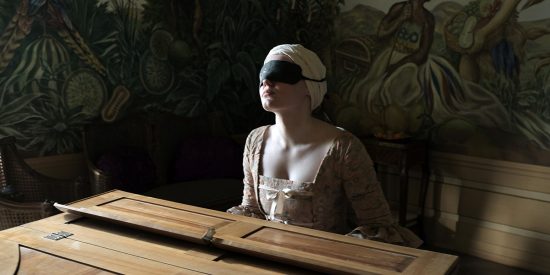TIFF Review: Mademoiselle Paradis – “Comes across as being really out of tune”
A talented harpsichordist in 18th century Venice seeks the help of a controversial physician to cure her blindness.
Maria Theresia von Paradis (Maria Dragus) plays the harpsichord at a gathering of the social elite of 18th century Venice hosted by her parents. She has strange mannerisms with her head while performing, a result of being blind. In an effort to find a cure the Paradis family seek out an unconventional physician Dr. Franz Mesmer (Devid Striesow) who accepts the challenge. A miraculous recovery occurs but not with entirely desirable results.
Impeccable production and costume design transport the viewer into a true story set in Habsburg Austria during the 1770s. The opening sequence at first seems like a daring creative choice to have the camera focused on the face of the Maria Theresia von Paradis as she performs rather than intercutting with the keyboard of the harpsichord. However, as the story progresses and there is a duet between Dr. Franz Mesmer and his patient one comes to realize it was more out of necessity than an artistic decision. The musical performances ring false which undermines the emotional significance of the scenes.
The group therapy sessions feel like a wannabe One Flew Over the Cuckoo’s Nest set in period clothes. Visually the colours are grand but the cinematography seems more functional than providing psychological and emotion insight into the characters and their situations. The lives of the servants and their relationships with patients also lack a sense of believability. One cannot help but feel that filmmaker Barbara Albert has made an intriguing and inspiring premise into something that comes across as being really out of tune.
Trevor Hogg is a freelance video editor and writer who currently resides in Canada; he can be found at LinkedIn.











